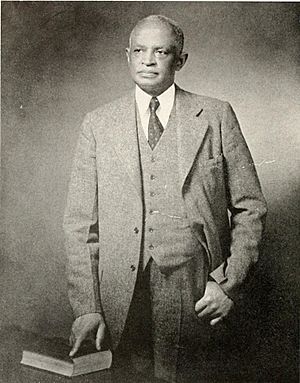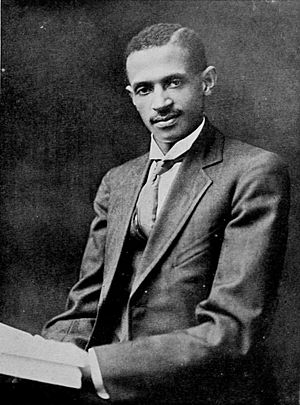James E. Shepard facts for kids
James Edward Shepard (born November 3, 1875 – died October 6, 1947) was an important American pharmacist, government worker, and teacher. He is best known for starting what is now North Carolina Central University (NCCU) in Durham, North Carolina. He first opened the school in 1910 to train people in religion. Later, he changed it to a school for teachers. He got help from many people, including wealthy supporters from the North.
Shepard was the school's first president and led it for almost 40 years. By 1923, he got the state to fund the school as a "normal school," which meant it would continue training Black teachers. After adding more classes to create a four-year program, the school was renamed North Carolina College for Negroes in 1925. It became the first state-funded college in the nation for Black students to offer a wide range of subjects (a liberal arts college).
Contents
Early Life and Family
James E. Shepard was born in Raleigh, North Carolina. His parents were Rev. Augustus and Harriet Whitted Shepard. He studied at Shaw University and finished his training there in 1894.
The next year, he married Annie Day Robinson. They had three daughters: Marjorie A. Shepard, Annie Day Shepard Smith, and Marion.
His Career Journey
Shepard moved to the Hayti District in Durham. This area was a growing community. He worked as a pharmacist there. Later, he also worked for the government and taught about religion. He became the president of the school he founded, which was first meant to train religious leaders.
Founding North Carolina Central University
In 1910, Shepard started a private school called the National Religious Training School and Chautauqua in the Hayti District. At first, it was a place for religious training. He later changed its name to the National Training School. Many of Shepard's friends, both Black and white, from the North and South, helped support the school with donations. One important supporter was Olivia Slocum Sage from New York.
A School for Teachers
The school helped Black teachers improve their skills during the Jim Crow era. During this time, laws often separated people by race. Education was very important in the Black community because everyone wanted to learn to read and write. Teachers from Shepard's school taught in the rural areas of Durham County.
Facing Challenges and Getting State Support
Shepard faced big problems trying to get enough money to keep his private school running. He found his own ways to deal with the difficulties of the Jim Crow era. For example, during Christmas, white store owners in Durham would bring their products to Shepard's office. This way, he could avoid any rude treatment he might face in downtown stores.
He kept asking the North Carolina General Assembly (the state's law-making group) for support for his "North Carolina College for Negroes." When he traveled to the legislature, Shepard drove his car instead of taking the train. This was because trains had separate seating for Black and white passengers under Jim Crow rules.
In 1923, the North Carolina legislature agreed to provide state funding. The school's name was then changed to Durham State Normal School. In 1925, the school added a four-year program. It became North Carolina College for Negroes. This was the first state-supported college in North Carolina and the United States that offered a wide range of subjects (liberal arts) for Black people. The first class to complete the four-year program graduated in 1929.
Growing into a University
In 1947, the school's name changed again to North Carolina College at Durham. In 1969, the General Assembly made it one of the state's regional universities. Its name then became North Carolina Central University. Since 1972, NCCU has been part of The University of North Carolina system.
Shepard's Lasting Legacy
- A middle school in Durham is named after him.
- Shepard was honored in 2019 at the Durham 150 Closing Ceremony. He was one of 29 people recognized for their dedication and achievements that helped shape Durham in important ways.
 | James Van Der Zee |
 | Alma Thomas |
 | Ellis Wilson |
 | Margaret Taylor-Burroughs |



